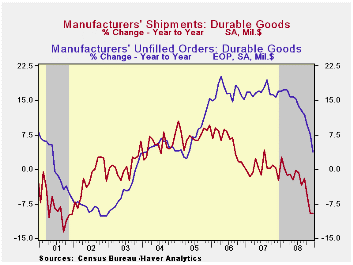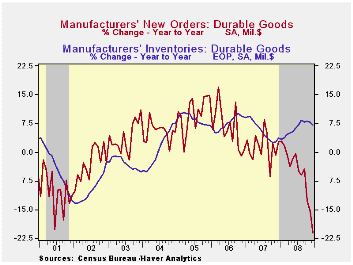 Global| Jan 29 2009
Global| Jan 29 2009U.S. Durable Goods Orders Slumped Further
by:Tom Moeller
|in:Economy in Brief
Summary
The factory sector continued to be hard hit by recession last month. New orders for durable goods fell during December for the fourth month in the last five. The 2.6% drop followed declines of 3.7% in November and 8.5% during October. [...]

The factory sector continued to be hard hit by recession last month. New orders for durable goods fell during December for the fourth month in the last five. The 2.6% drop followed declines of 3.7% in November and 8.5% during October. But since July new orders have plummeted 19.0%, the largest five-month drop since 1975. The December decline far exceeded Consensus expectations for a 2.0% shortfall.
Lower new orders for computers & electronic products led last month's decline with a 7.2% drop (-10.0% y/y). Orders for just computers & related products were quite weak, down 3.0% for the month and off 19.6% during the last twelve months. New orders for communications equipment also were down by a significant 4.9% (-9.9% y/y).
Severe weakness showed through in other industries. Orders for primary metals fell 6.9% last month and they're down 28.7% during the last twelve. Machinery orders fell hard for the fourth month in the last five and they are off 18.3% for the year. Electrical equipment bookings actually rose 9.4% last month but they're down by that amount December-to-December.
Capital equipment orders fell just 1.1%, but the 23.8% y/y decline reflected a 27.0% y/y drop in orders for nondefense capital goods. That decline was due to the severe weakness in aircraft orders which nearly halved last year. Still, without aircraft, nondefense capital goods orders were down a sharp 11.2% y/y to their lowest level since 2005. During the last ten years there has been an 80% correlation between the y/y change in nondefense capital goods orders and the change in equipment & software spending in the GDP accounts. The correlation of the GDP figure with capital goods shipments is, as one would expect, a larger 92%.
Reflecting this weakness in new orders was overall shipments of durable goods. They fell 0.7% last month and were down 9.5% for the year. For comparison, industrial production of durable goods fell 12.8% during 2008. During the last ten years there has been an 81% correlation between the twelve-month change in shipments of durable goods and the change in durables industrial production. Less transportation, shipments of durable goods fell 1.4% last month, off 7.0% for the year.
Lower orders have led inventories to back up. Inventories of manufactured durables rose 0.4% in December and the 7.0% y/y rate of increase has been fairly stable since the summer. That has been accompanied by lower order backlogs which have fallen sharply during the last three months. The year-to-year rise of 3.9% is the weakest since 2005.
| NAICS Classification (%) | December | November | Y/Y | 2008 | 2007 | 2006 |
|---|---|---|---|---|---|---|
| Durable Goods Orders | -2.6 | -3.7 | -21.1 | -5.6 | 1.4 | 6.2 |
| Excluding Transportation | -3.6 | -1.7 | -14.0 | -1.0 | -0.3 | 9.1 |
| Nondefense Capital Goods | -5.9 | -4.6 | -27.2 | -6.4 | 3.5 | 9.4 |
| Excluding Aircraft | -2.8 | 1.7 | -11.2 | 0.1 | -2.7 | 10.7 |
Tom Moeller
AuthorMore in Author Profile »Prior to joining Haver Analytics in 2000, Mr. Moeller worked as the Economist at Chancellor Capital Management from 1985 to 1999. There, he developed comprehensive economic forecasts and interpreted economic data for equity and fixed income portfolio managers. Also at Chancellor, Mr. Moeller worked as an equity analyst and was responsible for researching and rating companies in the economically sensitive automobile and housing industries for investment in Chancellor’s equity portfolio. Prior to joining Chancellor, Mr. Moeller was an Economist at Citibank from 1979 to 1984. He also analyzed pricing behavior in the metals industry for the Council on Wage and Price Stability in Washington, D.C. In 1999, Mr. Moeller received the award for most accurate forecast from the Forecasters' Club of New York. From 1990 to 1992 he was President of the New York Association for Business Economists. Mr. Moeller earned an M.B.A. in Finance from Fordham University, where he graduated in 1987. He holds a Bachelor of Arts in Economics from George Washington University.






